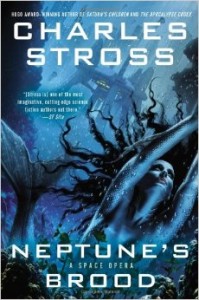 Neptune’s Brood, by Charles Stross
Neptune’s Brood, by Charles Stross
Synopsis: A post-human is chased across a star system and to the bottom of an ocean by competing wealthy and powerful people who want a code in her head worth a nigh-unimaginable fortune.
Book Review: Like all of Stross’s works, this combines an intricately built world and tight plotting with a biting sense of humor and palpable misanthropy. It’s a strange mix. The first section of the book takes part in a flying church that is SO GOTH my inner teen shrieks in delight (yeah, The Crow was one of my favorite movies in High School). It’s played for humor, and it’s a lot of fun while still being serious and disturbing in parts. Which, BTW, is another strange flavor to watch out for. There are occasional spikes of pure horror that drop out of nowhere and blast you with nightmare fuel, before going back to standard SF fare. The writing is clever, in some places overly so, but that helps to give it Lovecraftian overtones. It is an odd palette that Stross paints with.
The most notable thing about the book is that it reintroduces one to what “Noir” originally meant. Nowadays it’s used to mean that generic 40’s style, with wise-cracking guys in fedoras and tommy guns. I referred to Warbound as a “Noir” story. Nowadays it’s all about the furniture. But originally Noir meant a bleak, dark world that leaves the audience feeling soiled. In a Noir story every single person is in it only for themselves. There is no honor, no loyalty, no greater noble virtues to humanity. You can’t trust anyone in even the slightest regard (expect, perhaps, to pursue their own interests). Everyone cares only for their own selfish, short-term, monetary gain. It’s this grim, mercenary view of humanity that leaves you feeling dirty when you watch/read old Noir. Except, of course, usually the protagonist served as a sort of Jaded White Knight – cynical, but an idealist at heart. This book is like that, except the protagonist here is just as mercenary as everyone else.
In fairness, there is a society glimpsed near the end that surpasses human selfishness and is awesome, but they’re barely seen. For all its neat points, the story didn’t really compel me in any major way, expect perhaps to hate all humanity. And that’s not a feeling I’m particularly fond of. Not Recommended.
Book Club Review: It’s interesting that the book didn’t spark more discussion among our group, considering the very in-depth speculation on the workings of future societies. Upon consideration though, maybe I should have expected that. The economic framework Stross presents is elaborate and fascinating, but it’s not emotionally compelling. I was interested and enjoyed reading the many digressions into the slow-money financial system and its relation to our current monetary system, but I was never really gripped by anything. The story makes its way to the conclusion in an orderly and respectable manner, and then it’s over. Perhaps this would work well in a group that is grumpy and would be happy to talk about how people suck. After all, traditional-Noir used to be a popular genre (right?). But the mood seemed to stifle conversation a bit for us. Not Recommended.
Interesting. This description of Noir reminds me of Pact, especially the last few chapters; which also remind me of slatestarcodex talking about Moloch.